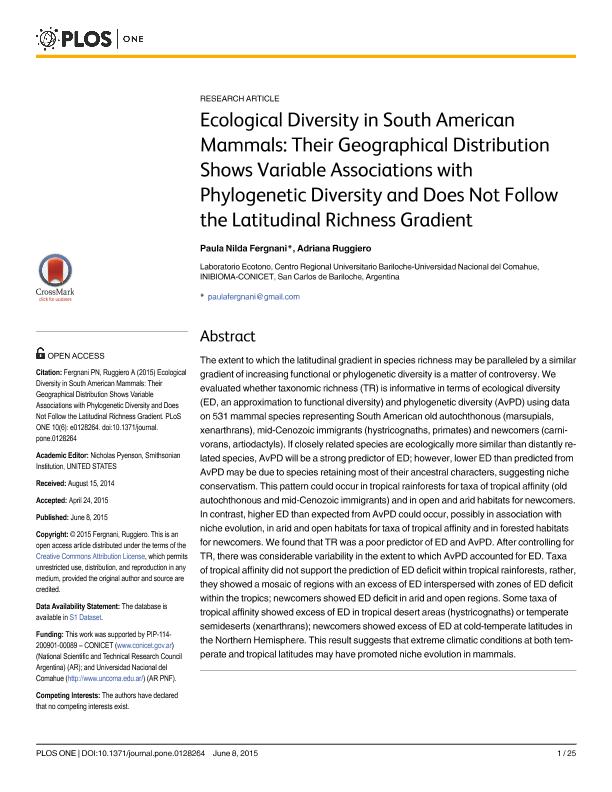Artículo
Ecological Diversity in South American Mammals: Their Geographical Distribution Shows Variable Associations with Phylogenetic Diversity and Does Not Follow the Latitudinal Richness Gradient
Fecha de publicación:
06/2015
Editorial:
Public Library Of Science
Revista:
Plos One
ISSN:
1932-6203
Idioma:
Inglés
Tipo de recurso:
Artículo publicado
Clasificación temática:
Resumen
The extent to which the latitudinal gradient in species richness may be paralleled by a similar gradient of increasing functional or phylogenetic diversity is a matter of controversy. We evaluated whether taxonomic richness (TR) is informative in terms of ecological diversity (ED, an approximation to functional diversity) and phylogenetic diversity (AvPD) using data on 531 mammal species representing South American old autochthonous (marsupials, xenarthrans), mid-Cenozoic immigrants (hystricognaths, primates) and newcomers (carnivorans, artiodactyls). If closely related species are ecologically more similar than distantly related species, AvPD will be a strong predictor of ED; however, lower ED than predicted from AvPD may be due to species retaining most of their ancestral characters, suggesting niche conservatism. This pattern could occur in tropical rainforests for taxa of tropical affinity (old autochthonous and mid-Cenozoic immigrants) and in open and arid habitats for newcomers. In contrast, higher ED than expected from AvPD could occur, possibly in association with niche evolution, in arid and open habitats for taxa of tropical affinity and in forested habitats for newcomers. We found that TR was a poor predictor of ED and AvPD. After controlling for TR, there was considerable variability in the extent to which AvPD accounted for ED. Taxa of tropical affinity did not support the prediction of ED deficit within tropical rainforests, rather, they showed a mosaic of regions with an excess of ED interspersed with zones of ED deficit within the tropics; newcomers showed ED deficit in arid and open regions. Some taxa of tropical affinity showed excess of ED in tropical desert areas (hystricognaths) or temperate semideserts (xenarthrans); newcomers showed excess of ED at cold-temperate latitudes in the Northern Hemisphere. This result suggests that extreme climatic conditions at both temperate and tropical latitudes may have promoted niche evolution in mammals.
Archivos asociados
Licencia
Identificadores
Colecciones
Articulos(INIBIOMA)
Articulos de INST. DE INVEST.EN BIODIVERSIDAD Y MEDIOAMBIENTE
Articulos de INST. DE INVEST.EN BIODIVERSIDAD Y MEDIOAMBIENTE
Citación
Fergnani, Paula Nilda; Ruggiero, Adriana; Ecological Diversity in South American Mammals: Their Geographical Distribution Shows Variable Associations with Phylogenetic Diversity and Does Not Follow the Latitudinal Richness Gradient; Public Library Of Science; Plos One; 10; 6; 6-2015; 1-25
Compartir
Altmétricas




